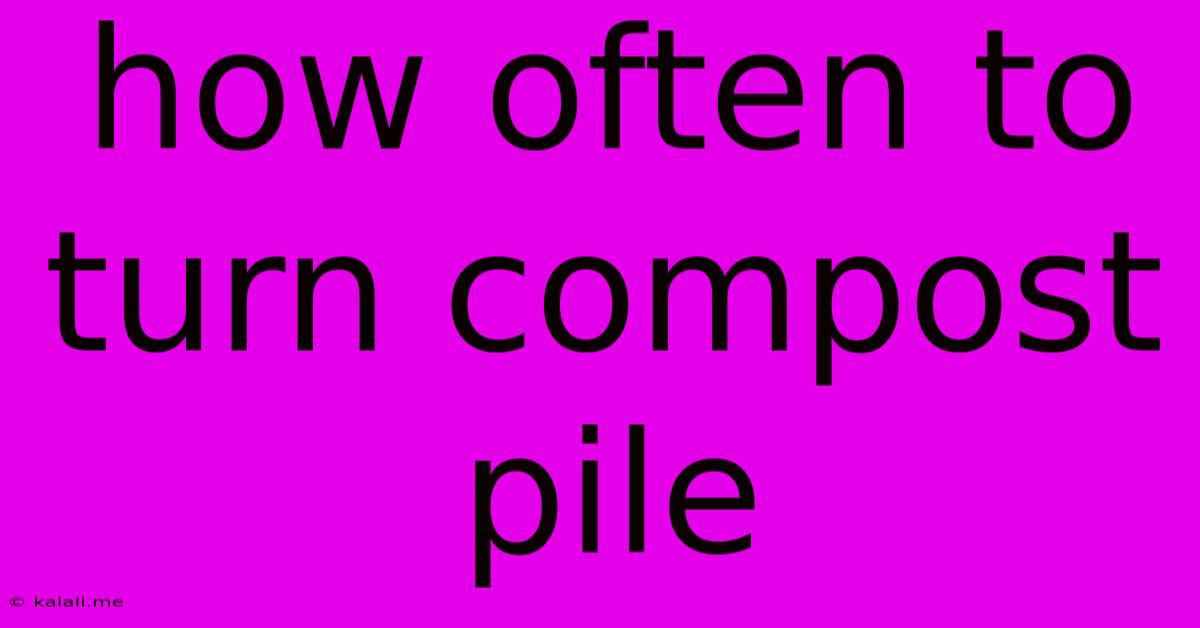How Often To Turn Compost Pile
Kalali
Jun 06, 2025 · 3 min read

Table of Contents
How Often Should You Turn Your Compost Pile? The Ultimate Guide to Aeration
Turning your compost pile might seem like a chore, but it's a crucial step in the composting process. Proper aeration ensures your organic materials break down efficiently, avoiding unpleasant smells and speeding up the decomposition process. But how often should you actually turn it? This guide will delve into the optimal frequency, factors influencing the need for turning, and tips for efficient compost management.
Understanding the Importance of Turning
Turning your compost pile, also known as aerating, introduces oxygen into the mix. Oxygen is essential for aerobic composting, the type you want, where beneficial microorganisms thrive and break down organic matter effectively. Without sufficient oxygen, anaerobic conditions develop, leading to foul odors, slow decomposition, and potentially harmful byproducts. Think of it like this: your compost pile needs to breathe! This is especially true if you are composting food waste.
How Often Should You Turn Your Compost Pile?
There's no one-size-fits-all answer. The ideal frequency depends on several factors:
- Pile Size: Smaller piles (under 1 cubic yard) may need turning more frequently, perhaps every few days, to maintain adequate aeration. Larger piles retain moisture and heat better, potentially requiring turning less often.
- Moisture Content: A consistently damp pile (like a wrung-out sponge) needs less frequent turning than a dry one. Dry piles need more frequent turning to incorporate moisture and oxygen.
- Material Composition: A mix of "browns" (carbon-rich materials like dried leaves and twigs) and "greens" (nitrogen-rich materials like grass clippings and fruit scraps) decomposes more efficiently and requires less turning. If your pile is heavily dominated by one or the other, it may benefit from more frequent turning.
- Ambient Temperature: Warmer temperatures accelerate decomposition, potentially increasing the need for more frequent turning. Cooler temperatures slow down the process, reducing the necessity of turning.
- Pile Activity: Visually check your pile regularly. If you see a lot of steam or notice a significant drop in temperature, it may indicate that the pile is decomposing too rapidly and needs to be turned and possibly layered or spread out. If you only notice minimal activity and smell no foul odours, you can turn it less frequently.
A Practical Guide to Turning Frequency:
- Weekly: For medium-sized piles (1-3 cubic yards) with a good balance of browns and greens and adequate moisture, weekly turning is generally sufficient.
- Every 2-3 Weeks: Larger, well-balanced piles might only need turning every couple of weeks.
- Every Few Days: Smaller piles, particularly those with an imbalance of materials or consistently dry conditions, may require turning every few days.
Tips for Efficient Turning:
- Use a garden fork or pitchfork: This allows you to gently turn the pile without breaking up the structure entirely.
- Layer your compost: Start with a layer of "browns", followed by "greens" and so on to promote optimal aeration from the start.
- Monitor your pile: Regularly check for moisture, temperature, and odor. These are key indicators of your pile's health and how frequently you need to turn it.
- Don't over-turn: Excessive turning can disrupt the beneficial microbial activity and dry out your pile.
By understanding the factors that influence turning frequency and following these tips, you can ensure your compost pile thrives and produces rich, nutrient-packed compost for your garden. Remember, observation is key! Adjust your turning schedule based on the specific needs of your compost pile.
Latest Posts
Latest Posts
-
How Do You Catch A Tame Rabbit
Jun 07, 2025
-
I Like To Read Philosophy Book French Translation
Jun 07, 2025
-
Can You Replace Undermount Sink With Overmount
Jun 07, 2025
-
Unzip A Zip File In Linux
Jun 07, 2025
-
How To Rip Up Linoleum Flooring
Jun 07, 2025
Related Post
Thank you for visiting our website which covers about How Often To Turn Compost Pile . We hope the information provided has been useful to you. Feel free to contact us if you have any questions or need further assistance. See you next time and don't miss to bookmark.